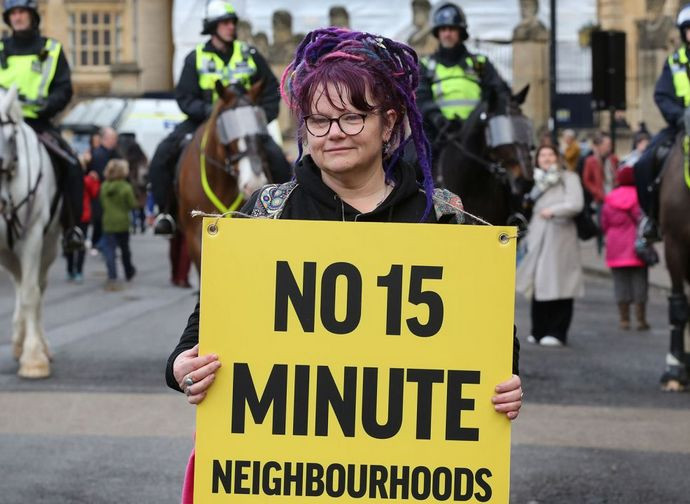The 15-Minute City is green totalitarianism
The 15-Minute City is a project to reorganise urban spaces. Oxford is the most advanced experiment, but the name was coined by Anne Hidalgo in Paris. All services must be within a 15-minute walk or cycle. It sounds appealing, but it will be the way to prevent free movement.

An initiative to radically transform the organisation of cities large and small is sweeping the world from Paris to Melbourne, but the media, with the exception of a few 'rebel' newspapers, refrain from talking about it. The project, christened '15-Minute City' by the mayor of Paris Anne Hidalgo, aims to redesign neighbourhoods and bring essential services closer to residents, so that they can be reached on foot or by bicycle in roughly 15 minutes, with the aim of improving both the air and the quality of life, and above all saving the planet from the 'terrible' CO2.
Put like that, it would seem to be a project that is not at all controversial. Instead, it has sparked protests, especially in the UK, where protesters against the '15-Minute City' have joined protests against London's ULEZ (Ultra Low Emission Zone), which closes traffic to vehicles that do not meet certain standards.
Described by Nigel Farage as a system 'that would be the envy of Pyongyang', the '15-Minute City' requires residents of a given neighbourhood to have permission to drive outside its perimeter. For example, in Oxford, the city in which the project is most advanced, residents will require a permit to leave their district more than 100 times in a year, and face being fined (£100 per offence) if they don’t have one.
In Rome, where achieving the '15-minute city' is one of the main objectives set out by the mayor Roberto Gualtieri, protests have flared up and reached right under his windows over the creation of an immense green zone with 51 access points, from which it is planned to exclude, starting in October - with sanctions applied from November - all cars that do not meet certain ecological parameters.
In the face of vibrant protests, the Oxford City Council issued a statement clarifying that there are no physical barriers to the exit of cars (even though there are already bollards in some streets, not surprisingly subject to sabotage at night), but only cameras capable of reading number plates in order to apply fines. Those who have run out of permits, we are assured, will always be able to leave the assigned perimeter by following a certain longer route.
These assurances, however, have not yet calmed the fears of those who reject the very concept of having to ask for a permit to move freely by car, especially when one reads the targets declared by the C40 Consortium of Mayors, based on the goals of the UN 2030 Agenda. As outlined by Canadian sociologist Jordan Peterson, they aim to reduce per capita calorie intake to 2,500 calories per day within the next 15 years; to ensure that the lower classes, which include everyone but the elite cannot take a plane more than once every three years; to eliminate 90% of private cars to force people to use public transport, where it exists, which is invariably time-consuming; and to limit the amount of travel possible outside their neighbourhoods.
The experience of the pandemic lockdowns has undoubtedly made many citizens who would once have been more confident in top-down solutions to global problems, mistrustful of the authorities. For example, there are already those who ironise that for Paris, which for the 2024 Olympic Games will close 185 kilometres of roads and install the necessary control cameras, it would be absurd, once the event is over, to restore the initial situation instead of leaving in place exclusion zones useful for separating the plebs from those variously 'authorised'.
Moreover, the media campaigns which, in the name of official science, censored discordant opinions, even authoritative ones, during the pandemic, branding them as 'disinformation', have led many to listen for the first time to the voice of those who explain that CO2 is not bad but vital for vegetation, which would invalidate the very basis for any restriction on people's freedom of movement.
But the 15-minute cities (changing their name to 20 minutes or 30 minutes for areas where distances are greater), could be just a step towards the reorganisation dreamed up by world government advocates, if one considers the TriState City project, the mega-city planned for a slice of northern Europe that would cover the Netherlands and overflow into Belgium and Germany. The Dutch government website denies that this project has any connection with the policies against the use of nitrogen in agriculture of the Rutte government - defenestrated, not surprisingly, at the last elections - which threaten the very survival of agriculture.
Even further ahead, in a technological sense, is The Line project, launched in 2021 by Saudi Arabia, which envisages a luxury but car-free city that will stretch 170 km across the desert, behind 500-metre-high walls, invisible because covered by a mirror. Inside, 9 million Neomians, so called after the name given to this new location, will be able to move from one side of the city to the other in a few minutes thanks to a high-speed train.
